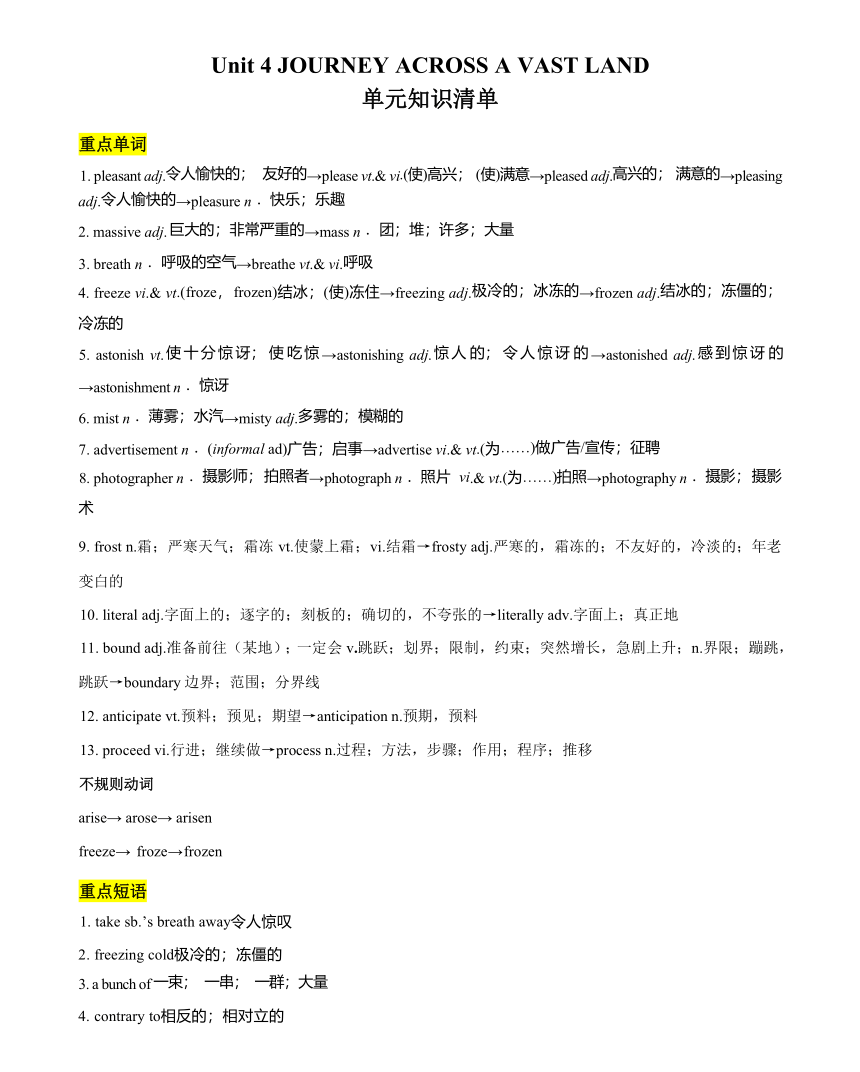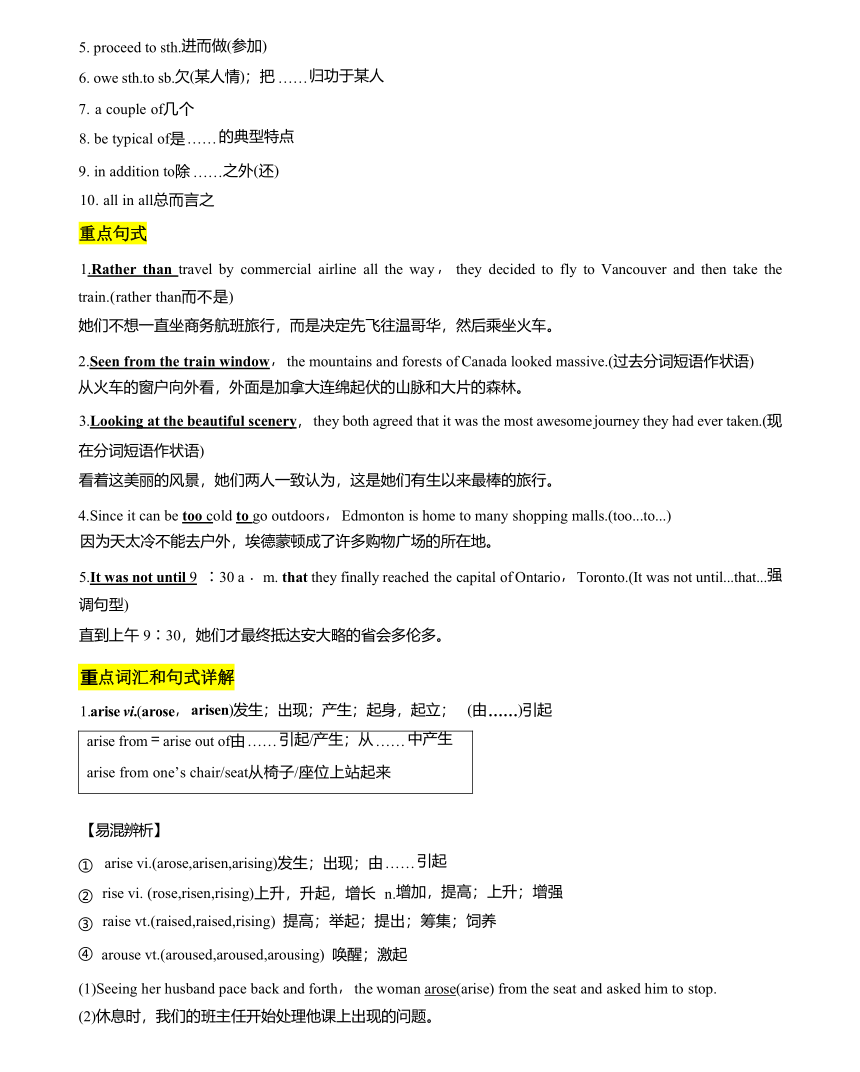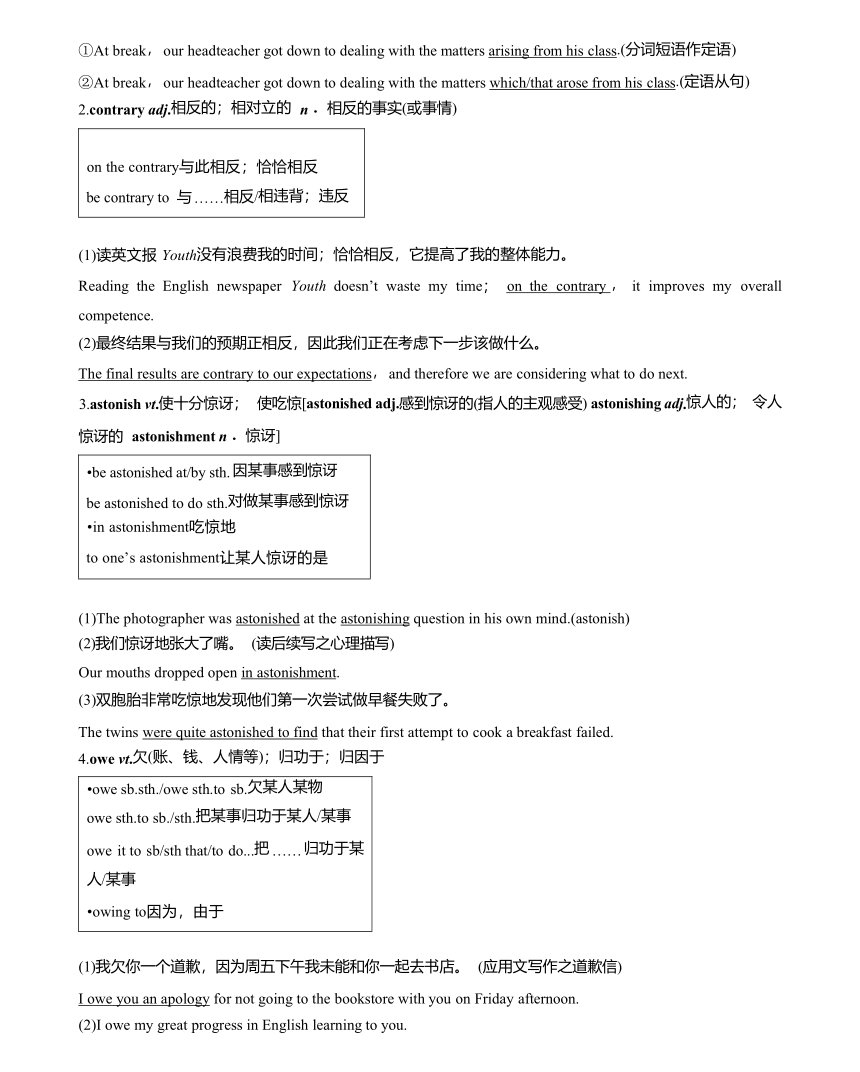人教版(2019)选择性必修 第二册Unit 4 Journey Across a Vast Land单元知识清单讲义
文档属性
| 名称 | 人教版(2019)选择性必修 第二册Unit 4 Journey Across a Vast Land单元知识清单讲义 |

|
|
| 格式 | docx | ||
| 文件大小 | 28.7KB | ||
| 资源类型 | 教案 | ||
| 版本资源 | 人教版(2019) | ||
| 科目 | 英语 | ||
| 更新时间 | 2024-04-24 00:00:00 | ||
图片预览



文档简介
Unit 4 JOURNEY ACROSS A VAST LAND 单元知识清单
重点单词
1. pleasant adj.令人愉快的; 友好的→please vt.& vi.(使)高兴; (使)满意→pleased adj.高兴的; 满意的→pleasing adj.令人愉快的→pleasure n .快乐;乐趣
2. massive adj. 巨大的;非常严重的→mass n .团;堆;许多;大量
3. breath n .呼吸的空气→breathe vt.& vi.呼吸
4. freeze vi.& vt.(froze, frozen)结冰;(使)冻住→freezing adj.极冷的;冰冻的→frozen adj.结冰的;冻僵的;
冷冻的
5. astonish vt. 使 十 分 惊 讶; 使 吃 惊 →astonishing adj. 惊 人 的; 令 人 惊 讶 的 →astonished adj. 感 到 惊 讶 的
→astonishment n .惊讶
6. mist n .薄雾;水汽→misty adj.多雾的;模糊的
7. advertisement n .(informal ad)广告;启事→advertise vi.& vt.(为……)做广告/宣传;征聘
8. photographer n .摄影师; 拍照者→photograph n .照片 vi.& vt.(为……)拍照→photography n .摄影; 摄影
术
9. frost n.霜;严寒天气;霜冻 vt.使蒙上霜;vi.结霜→frosty adj.严寒的,霜冻的;不友好的,冷淡的;年老
变白的
10. literal adj.字面上的;逐字的;刻板的;确切的,不夸张的→literally adv.字面上;真正地
11. bound adj.准备前往(某地);一定会 v.跳跃;划界;限制,约束;突然增长,急剧上升;n.界限;蹦跳,
跳跃→boundary 边界;范围;分界线
12. anticipate vt.预料;预见;期望→anticipation n.预期,预料
13. proceed vi.行进;继续做→process n.过程;方法,步骤;作用;程序;推移
不规则动词
arise→ arose→ arisen
freeze→ froze→frozen
重点短语
1. take sb.’s breath away令人惊叹
2. freezing cold极冷的;冻僵的
3. a bunch of 一束; 一串; 一群;大量
4. contrary to相反的;相对立的
5. proceed to sth.进而做(参加)
6. owe sth.to sb.欠(某人情);把 …… 归功于某人
7. a couple of几个
8. be typical of是 …… 的典型特点
9. in addition to除 ……之外(还)
10. all in all总而言之
重点句式
1.Rather than travel by commercial airline all the way , they decided to fly to Vancouver and then take the
train.(rather than而不是)
她们不想一直坐商务航班旅行,而是决定先飞往温哥华,然后乘坐火车。
2.Seen from the train window, the mountains and forests of Canada looked massive.(过去分词短语作状语) 从火车的窗户向外看,外面是加拿大连绵起伏的山脉和大片的森林。
3.Looking at the beautiful scenery, they both agreed that it was the most awesome journey they had ever taken.(现
在分词短语作状语)
看着这美丽的风景,她们两人一致认为,这是她们有生以来最棒的旅行。
4.Since it can be too cold to go outdoors, Edmonton is home to many shopping malls.(too...to...)
因为天太冷不能去户外,埃德蒙顿成了许多购物广场的所在地。
5.It was not until 9 ∶30 a .m. that they finally reached the capital of Ontario, Toronto.(It was not until...that...强
调句型)
直到上午 9∶30,她们才最终抵达安大略的省会多伦多。
(
重
点词汇和句式详解
)
1.arise vi.(arose, arisen)发生;出现;产生;起身,起立; (由 ……)引起
arise from=arise out of由 …… 引起/产生;从 …… 中产生 arise from one’s chair/seat从椅子/座位上站起来
【易混辨析】
① arise vi.(arose,arisen,arising)发生;出现;由 …… 引起
② rise vi. (rose,risen,rising)上升,升起,增长 n.增加,提高;上升;增强
③ raise vt.(raised,raised,rising) 提高;举起;提出;筹集;饲养
④ arouse vt.(aroused,aroused,arousing) 唤醒;激起
(1)Seeing her husband pace back and forth, the woman arose(arise) from the seat and asked him to stop.
(2)休息时,我们的班主任开始处理他课上出现的问题。
①At break, our headteacher got down to dealing with the matters arising from his class.(分词短语作定语) ②At break, our headteacher got down to dealing with the matters which/that arose from his class.(定语从句)
2.contrary adj.相反的;相对立的 n .相反的事实(或事情)
on the contrary与此相反;恰恰相反 be contrary to 与 ……相反/相违背;违反
(1)读英文报 Youth没有浪费我的时间;恰恰相反,它提高了我的整体能力。
Reading the English newspaper Youth doesn’t waste my time; on the contrary , it improves my overall
competence.
(2)最终结果与我们的预期正相反,因此我们正在考虑下一步该做什么。
The final results are contrary to our expectations, and therefore we are considering what to do next.
3.astonish vt.使十分惊讶; 使吃惊[astonished adj.感到惊讶的(指人的主观感受) astonishing adj.惊人的; 令人
惊讶的 astonishment n .惊讶]
be astonished at/by sth. 因某事感到惊讶 be astonished to do sth.对做某事感到惊讶 in astonishment吃惊地 to one’s astonishment让某人惊讶的是
(1)The photographer was astonished at the astonishing question in his own mind.(astonish)
(2)我们惊讶地张大了嘴。 (读后续写之心理描写)
Our mouths dropped open in astonishment.
(3)双胞胎非常吃惊地发现他们第一次尝试做早餐失败了。
The twins were quite astonished to find that their first attempt to cook a breakfast failed.
4.owe vt.欠(账、钱、人情等);归功于;归因于
owe sb.sth./owe sth.to sb.欠某人某物 owe sth.to sb./sth.把某事归功于某人/某事 owe it to sb/sth that/to do...把 …… 归功于某 人/某事 owing to因为,由于
(1)我欠你一个道歉,因为周五下午我未能和你一起去书店。 (应用文写作之道歉信)
I owe you an apology for not going to the bookstore with you on Friday afternoon.
(2)I owe my great progress in English learning to you.
→I owe it to you that I have made great progress in English learning.(用 owe it to sb.that改写)
→I owe it to you to make great progress in English learning.(用 owe it to sb.to do改写)
5. rather than 而不是;宁可 ……也不愿
Rather than travel by commercial airline all the way, they decided to fly to Vancouver and then take the
train.她们不想一直乘商务航班旅行,而是决定先飞到温哥华,然后乘坐火车。
rather than 连接的两个并列成分作主语时, 谓语动词与 rather than前面的成分在人称和数上 保持一致。 常见的含 rather than的句型: (
would
rather
do
...
than
do
...
)pr (w)e (o)f (u)e (l)r (d)to (d)od (..)o (.r)arather th (ther than)an (do)do (...) ...}宁愿做 ……也不做 ……
(1) It was they rather than I were (be) to blame for the silly mistake.
(2)不是像西方人使用刀叉吃饭,中国人更喜欢用筷子。 (话题写作之传统文化)
Rather than use knives and forks as Westerners do, Chinese people prefer to eat with chopsticks. (3)尽管面对许多巨大的困难,但我宁愿死也不愿放弃。
①In spite of many massive difficulties, I would rather die than give up.(would rather do...than do...)
②In spite of many massive difficulties, I would die rather than give up.(would do...rather than do...)
③In spite of many massive difficulties, I preferred to die rather than give up.(prefer to do...rather than do...)
6.too…to … 太 …… 而不能 … … .
Since it can be too cold to go outdoors, Edmonton is home to many shopping malls.
因为天太冷不能去户外,埃德蒙顿成了许多购物广场的所在地。
too+adj./adv.(for sb.)+to do sth.表示否定的意义,意为“太 …… 而不能”。 当“too...to...”结构用来修饰表达人的态度、情绪倾向的形容词, 如 anxious, eager, glad, happy,pleased, ready, willing等时,表示肯定意义,意为“ 非常”。 can’t/can never...too...再怎么 ……也不过分。
我非常高兴地得知您对长城感兴趣。长城太壮观而不容错过。正如一句老话所说:“不到长城非好汉。 ” 因
此,我怎么强调爬长城的意义都不过分。 (传统文化之长城)
I am too pleased to learn that you are keen on the Great Wall.The Great Wall is too spectacular to miss.Just as an old
saying goes, “He who does not reach the Great Wall is not a true man.” So I can’t/can never stress the significance
of climbing the Great Wall too much.
重点语法详解
过去分词和动词-ing 形式作表语、作状语的区别、过去分词(短语)作表语与被动语态的区别
一、过去分词和动词-ing 形式作表语
①He looked worried after reading the letter.看完信后,他显得很忧虑。
②His words were discouraging, which made many people discouraged.他的话令人泄气,使得很多人灰心丧气。 总结: 表语常放在 be ,get ,feel ,remain ,seem ,look ,become 等系动词之后; 过去分词作表语表示人或 物的心情或状态等,也可理解为心情或状态受到外界影响,有“感到…… ”之意;动词-ing 形式作表语表
示人或物的自身特征,有“令人…… ”之意。
二、过去分词和动词-ing 形式作状语
①Used for a long time ,the book looks old. 由于用了很长时间,这本书看上去陈旧了。
②Using the book ,I find it very useful.在使用这本书时,我发现它很有用。
总结: 过去分词与其逻辑主语之间是被动关系,往往表示完成;动词-ing 形式与其逻辑主语之间是主动关
系,一般表示动作正在进行。
三、过去分词(短语)作表语与被动语态的区别
①The cup is broken.杯子碎了。 (系表结构)
②The cup was broken by Tom.杯子是被汤姆打碎的。 (被动语态)
总结;过去分词(短语)作表语时,强调主语所处的状态,而谓语动词的被动语态表示主语是动作的承受者,
强调动作。
单元写作重点
本单元的写作目标是写一篇关于旅行的邮件,也就是对一次出行、游览、参观等的记录。这类文章一 般分为三部分:第一部分介绍自己游览或参观的地点。第二部分写自己的游览经历,也是文章的重点。第 三部分往往以向朋友发出邀请来结束全文。在介绍游览经历时,一般按游览的先后顺序写,由先而后依次 记述游览过程中所见到的景物。另外要选取自己印象最深刻的或最有特色的景物,作较为详细的描写。最
后可以加上自己的感受,做到既有所见所闻,又有所思所感,深化写作主题。
常用表达
1 .I’d like to share one of the most fascinating experiences with you.
2 .I’m glad to share a truly unforgettable travel experience that I had during my last summer holiday with you.
3 .Last week/month/year ,I paid a visit to... ,which is famous for...
4 .It lies/is located/situated in...
5 .The scenery is so beautiful that it takes the tourists’ breath away.
6 .Wherever you go ,there are plenty of activities to choose from.
7 .It has become one of the most popular tourist attractions in the world.
8 .We were all tired ,but our trip to...was really unforgettable.
写作范文
假设你是李华, 你的英国笔友 Tom 写信询问你的一次难忘的旅游经历。请你用英语给他回一封邮件,要点
包括:
1 .旅游过程;
2 .你的感受。
注意:
1 .词数 80 左右;
2 .开头和结尾已给出,但不计入总词数。
参考词汇:大佛 the Giant Stone Buddha
Dear Tom,
I’m glad to share a truly fascinating travel experience that I had during my last summer holiday with you.
On July 7 ,my parents and I took a bus to Leshan ,Sichuan Province ,which is famous for the Giant Stone Buddha.The Buddha is literally big.Looking up at the large head and down at the large feet ,I felt I was so small.The next day ,we climbed Mount Emei ,where the beautiful scenery took our breath away. There are many old temples and wild monkeys. At dusk,we made our way back.We were all tired,but our trip to Leshan was really
unforgettable.If I have time ,I am bound to pay a visit to Leshan again.
I’m looking forward to going there with you next time.
Yours,
Li Hua
重点单词
1. pleasant adj.令人愉快的; 友好的→please vt.& vi.(使)高兴; (使)满意→pleased adj.高兴的; 满意的→pleasing adj.令人愉快的→pleasure n .快乐;乐趣
2. massive adj. 巨大的;非常严重的→mass n .团;堆;许多;大量
3. breath n .呼吸的空气→breathe vt.& vi.呼吸
4. freeze vi.& vt.(froze, frozen)结冰;(使)冻住→freezing adj.极冷的;冰冻的→frozen adj.结冰的;冻僵的;
冷冻的
5. astonish vt. 使 十 分 惊 讶; 使 吃 惊 →astonishing adj. 惊 人 的; 令 人 惊 讶 的 →astonished adj. 感 到 惊 讶 的
→astonishment n .惊讶
6. mist n .薄雾;水汽→misty adj.多雾的;模糊的
7. advertisement n .(informal ad)广告;启事→advertise vi.& vt.(为……)做广告/宣传;征聘
8. photographer n .摄影师; 拍照者→photograph n .照片 vi.& vt.(为……)拍照→photography n .摄影; 摄影
术
9. frost n.霜;严寒天气;霜冻 vt.使蒙上霜;vi.结霜→frosty adj.严寒的,霜冻的;不友好的,冷淡的;年老
变白的
10. literal adj.字面上的;逐字的;刻板的;确切的,不夸张的→literally adv.字面上;真正地
11. bound adj.准备前往(某地);一定会 v.跳跃;划界;限制,约束;突然增长,急剧上升;n.界限;蹦跳,
跳跃→boundary 边界;范围;分界线
12. anticipate vt.预料;预见;期望→anticipation n.预期,预料
13. proceed vi.行进;继续做→process n.过程;方法,步骤;作用;程序;推移
不规则动词
arise→ arose→ arisen
freeze→ froze→frozen
重点短语
1. take sb.’s breath away令人惊叹
2. freezing cold极冷的;冻僵的
3. a bunch of 一束; 一串; 一群;大量
4. contrary to相反的;相对立的
5. proceed to sth.进而做(参加)
6. owe sth.to sb.欠(某人情);把 …… 归功于某人
7. a couple of几个
8. be typical of是 …… 的典型特点
9. in addition to除 ……之外(还)
10. all in all总而言之
重点句式
1.Rather than travel by commercial airline all the way , they decided to fly to Vancouver and then take the
train.(rather than而不是)
她们不想一直坐商务航班旅行,而是决定先飞往温哥华,然后乘坐火车。
2.Seen from the train window, the mountains and forests of Canada looked massive.(过去分词短语作状语) 从火车的窗户向外看,外面是加拿大连绵起伏的山脉和大片的森林。
3.Looking at the beautiful scenery, they both agreed that it was the most awesome journey they had ever taken.(现
在分词短语作状语)
看着这美丽的风景,她们两人一致认为,这是她们有生以来最棒的旅行。
4.Since it can be too cold to go outdoors, Edmonton is home to many shopping malls.(too...to...)
因为天太冷不能去户外,埃德蒙顿成了许多购物广场的所在地。
5.It was not until 9 ∶30 a .m. that they finally reached the capital of Ontario, Toronto.(It was not until...that...强
调句型)
直到上午 9∶30,她们才最终抵达安大略的省会多伦多。
(
重
点词汇和句式详解
)
1.arise vi.(arose, arisen)发生;出现;产生;起身,起立; (由 ……)引起
arise from=arise out of由 …… 引起/产生;从 …… 中产生 arise from one’s chair/seat从椅子/座位上站起来
【易混辨析】
① arise vi.(arose,arisen,arising)发生;出现;由 …… 引起
② rise vi. (rose,risen,rising)上升,升起,增长 n.增加,提高;上升;增强
③ raise vt.(raised,raised,rising) 提高;举起;提出;筹集;饲养
④ arouse vt.(aroused,aroused,arousing) 唤醒;激起
(1)Seeing her husband pace back and forth, the woman arose(arise) from the seat and asked him to stop.
(2)休息时,我们的班主任开始处理他课上出现的问题。
①At break, our headteacher got down to dealing with the matters arising from his class.(分词短语作定语) ②At break, our headteacher got down to dealing with the matters which/that arose from his class.(定语从句)
2.contrary adj.相反的;相对立的 n .相反的事实(或事情)
on the contrary与此相反;恰恰相反 be contrary to 与 ……相反/相违背;违反
(1)读英文报 Youth没有浪费我的时间;恰恰相反,它提高了我的整体能力。
Reading the English newspaper Youth doesn’t waste my time; on the contrary , it improves my overall
competence.
(2)最终结果与我们的预期正相反,因此我们正在考虑下一步该做什么。
The final results are contrary to our expectations, and therefore we are considering what to do next.
3.astonish vt.使十分惊讶; 使吃惊[astonished adj.感到惊讶的(指人的主观感受) astonishing adj.惊人的; 令人
惊讶的 astonishment n .惊讶]
be astonished at/by sth. 因某事感到惊讶 be astonished to do sth.对做某事感到惊讶 in astonishment吃惊地 to one’s astonishment让某人惊讶的是
(1)The photographer was astonished at the astonishing question in his own mind.(astonish)
(2)我们惊讶地张大了嘴。 (读后续写之心理描写)
Our mouths dropped open in astonishment.
(3)双胞胎非常吃惊地发现他们第一次尝试做早餐失败了。
The twins were quite astonished to find that their first attempt to cook a breakfast failed.
4.owe vt.欠(账、钱、人情等);归功于;归因于
owe sb.sth./owe sth.to sb.欠某人某物 owe sth.to sb./sth.把某事归功于某人/某事 owe it to sb/sth that/to do...把 …… 归功于某 人/某事 owing to因为,由于
(1)我欠你一个道歉,因为周五下午我未能和你一起去书店。 (应用文写作之道歉信)
I owe you an apology for not going to the bookstore with you on Friday afternoon.
(2)I owe my great progress in English learning to you.
→I owe it to you that I have made great progress in English learning.(用 owe it to sb.that改写)
→I owe it to you to make great progress in English learning.(用 owe it to sb.to do改写)
5. rather than 而不是;宁可 ……也不愿
Rather than travel by commercial airline all the way, they decided to fly to Vancouver and then take the
train.她们不想一直乘商务航班旅行,而是决定先飞到温哥华,然后乘坐火车。
rather than 连接的两个并列成分作主语时, 谓语动词与 rather than前面的成分在人称和数上 保持一致。 常见的含 rather than的句型: (
would
rather
do
...
than
do
...
)pr (w)e (o)f (u)e (l)r (d)to (d)od (..)o (.r)arather th (ther than)an (do)do (...) ...}宁愿做 ……也不做 ……
(1) It was they rather than I were (be) to blame for the silly mistake.
(2)不是像西方人使用刀叉吃饭,中国人更喜欢用筷子。 (话题写作之传统文化)
Rather than use knives and forks as Westerners do, Chinese people prefer to eat with chopsticks. (3)尽管面对许多巨大的困难,但我宁愿死也不愿放弃。
①In spite of many massive difficulties, I would rather die than give up.(would rather do...than do...)
②In spite of many massive difficulties, I would die rather than give up.(would do...rather than do...)
③In spite of many massive difficulties, I preferred to die rather than give up.(prefer to do...rather than do...)
6.too…to … 太 …… 而不能 … … .
Since it can be too cold to go outdoors, Edmonton is home to many shopping malls.
因为天太冷不能去户外,埃德蒙顿成了许多购物广场的所在地。
too+adj./adv.(for sb.)+to do sth.表示否定的意义,意为“太 …… 而不能”。 当“too...to...”结构用来修饰表达人的态度、情绪倾向的形容词, 如 anxious, eager, glad, happy,pleased, ready, willing等时,表示肯定意义,意为“ 非常”。 can’t/can never...too...再怎么 ……也不过分。
我非常高兴地得知您对长城感兴趣。长城太壮观而不容错过。正如一句老话所说:“不到长城非好汉。 ” 因
此,我怎么强调爬长城的意义都不过分。 (传统文化之长城)
I am too pleased to learn that you are keen on the Great Wall.The Great Wall is too spectacular to miss.Just as an old
saying goes, “He who does not reach the Great Wall is not a true man.” So I can’t/can never stress the significance
of climbing the Great Wall too much.
重点语法详解
过去分词和动词-ing 形式作表语、作状语的区别、过去分词(短语)作表语与被动语态的区别
一、过去分词和动词-ing 形式作表语
①He looked worried after reading the letter.看完信后,他显得很忧虑。
②His words were discouraging, which made many people discouraged.他的话令人泄气,使得很多人灰心丧气。 总结: 表语常放在 be ,get ,feel ,remain ,seem ,look ,become 等系动词之后; 过去分词作表语表示人或 物的心情或状态等,也可理解为心情或状态受到外界影响,有“感到…… ”之意;动词-ing 形式作表语表
示人或物的自身特征,有“令人…… ”之意。
二、过去分词和动词-ing 形式作状语
①Used for a long time ,the book looks old. 由于用了很长时间,这本书看上去陈旧了。
②Using the book ,I find it very useful.在使用这本书时,我发现它很有用。
总结: 过去分词与其逻辑主语之间是被动关系,往往表示完成;动词-ing 形式与其逻辑主语之间是主动关
系,一般表示动作正在进行。
三、过去分词(短语)作表语与被动语态的区别
①The cup is broken.杯子碎了。 (系表结构)
②The cup was broken by Tom.杯子是被汤姆打碎的。 (被动语态)
总结;过去分词(短语)作表语时,强调主语所处的状态,而谓语动词的被动语态表示主语是动作的承受者,
强调动作。
单元写作重点
本单元的写作目标是写一篇关于旅行的邮件,也就是对一次出行、游览、参观等的记录。这类文章一 般分为三部分:第一部分介绍自己游览或参观的地点。第二部分写自己的游览经历,也是文章的重点。第 三部分往往以向朋友发出邀请来结束全文。在介绍游览经历时,一般按游览的先后顺序写,由先而后依次 记述游览过程中所见到的景物。另外要选取自己印象最深刻的或最有特色的景物,作较为详细的描写。最
后可以加上自己的感受,做到既有所见所闻,又有所思所感,深化写作主题。
常用表达
1 .I’d like to share one of the most fascinating experiences with you.
2 .I’m glad to share a truly unforgettable travel experience that I had during my last summer holiday with you.
3 .Last week/month/year ,I paid a visit to... ,which is famous for...
4 .It lies/is located/situated in...
5 .The scenery is so beautiful that it takes the tourists’ breath away.
6 .Wherever you go ,there are plenty of activities to choose from.
7 .It has become one of the most popular tourist attractions in the world.
8 .We were all tired ,but our trip to...was really unforgettable.
写作范文
假设你是李华, 你的英国笔友 Tom 写信询问你的一次难忘的旅游经历。请你用英语给他回一封邮件,要点
包括:
1 .旅游过程;
2 .你的感受。
注意:
1 .词数 80 左右;
2 .开头和结尾已给出,但不计入总词数。
参考词汇:大佛 the Giant Stone Buddha
Dear Tom,
I’m glad to share a truly fascinating travel experience that I had during my last summer holiday with you.
On July 7 ,my parents and I took a bus to Leshan ,Sichuan Province ,which is famous for the Giant Stone Buddha.The Buddha is literally big.Looking up at the large head and down at the large feet ,I felt I was so small.The next day ,we climbed Mount Emei ,where the beautiful scenery took our breath away. There are many old temples and wild monkeys. At dusk,we made our way back.We were all tired,but our trip to Leshan was really
unforgettable.If I have time ,I am bound to pay a visit to Leshan again.
I’m looking forward to going there with you next time.
Yours,
Li Hua
